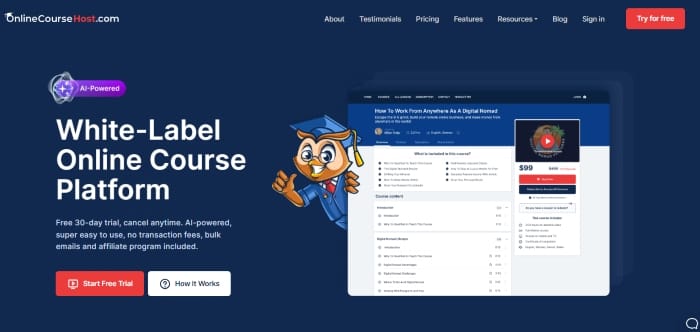How to Launch a Podcast To Skyrocket Your Online Course Sales?
 Platform Review
Platform Review

Would you like to build another traffic stream to sell online courses? Have you thought about starting a podcast? Learn step-by-step how to launch a podcast to skyrocket your online course sales.
If you're an online course creator looking to boost your sales and reach more potential students, launching a podcast could be a game-changer.
Podcasting has exploded in popularity over the past few years, with millions of listeners tuning in to their favorite shows on a variety of topics.
By launching your podcast related to your course subject, you can tap into this engaged audience and position yourself as an authority in your niche.
Moreover, a well-executed podcast can not only drive more traffic to your online course but also help you build deeper connections with your audience.
In this post, I'll delve into why podcasting can be a great way to promote and sell your online courses.
Plus, I'll give you a step-by-step guide on launching your podcast, enabling you to build an audience and expand your online course business.
So, how do I launch a podcast to sell online courses?
Here are the 7 steps you need to follow to launch your podcast and start selling online courses.
- Choose your podcast topic (with USP)
- Decide your podcast format
- Create a content plan
- Choose the right equipment
- Record your first podcast
- Publish your podcast
- Promote your podcast
Worry not, we’re going to discuss these steps in detail.
You can also check out all the free guides available at the Course Creator Academy.
Let’s begin by telling you why you should start a podcast.
Why Start a Podcast as an Online Course Creator?
Of all marketing methods, podcasting is one of those that requires minimum effort. Think about it; podcasting is talking that you do all the time. Of course, you still need to commit, but there are still many reasons:
1. Nearly 500 million people listen to podcasts
Podcasts are growing in popularity. As of 2023, there are 464.7 million podcast listeners. So, it’s a significant audience size to tap into.
Imagine getting 0.1% of this audience to sign up for your courses. It’s still a considerable number.
2. Podcasts are easily accessible
People love podcasts because they’re easily accessible. They don’t require much attention and are the best complementary work while multitasking.
Think about it, if someone reads your email - they’ll have to pay attention to it. If someone is watching your YouTube video - they’ll have to pay attention to it.
But if someone is listening to your podcast - they don’t have to pay special attention because it’s just like listening to music they can do - whenever, wherever, and however.
3. Establish yourself as an authority faster
Just like videos, podcasts help you showcase your personality better than blog posts or emails. You’re generally speaking in a podcast, so your audience is more likely to familiarize themselves with you.
Speaking on podcasts as a thought leader will help you establish credibility quickly, and your followers will become students quickly.
4. Build a loyal customer base
Starting a podcast will open up new audiences you wouldn’t have discovered otherwise.
Have you thought about it? People listen to podcasts because they don’t like (or have time) to read blog posts, social media posts, and emails or watch YouTube videos.
By starting a podcast, you’re not marketing to the same audience; it’s a new audience with new opportunities.
Now that you know starting a podcast unlocks new audiences and helps you build credibility faster; it’s time to learn how to launch one.
How to Start a Podcast: Step-by-step Process
Launching the podcast will take you less than two minutes, but before that, you should spend some time planning it.
The first five steps will show you how to plan your podcast, and the next two will show you how to make online course sales.
1. Choose your podcast topic (with USP)

You can start a podcast now, but do you know what you will talk about?
Of course! I’d talk about my courses since I’m an online course creator - you’d say.
Yes, that’s right! Launching your podcast on the topic you’re an expert on makes sense.
But many successful podcasters already discuss the same topic, so how would you make yours stand out?
That’s right! By making your podcast unique.
Think about how you can make your podcast unique. What makes you different? Is it your teaching method? Or are your examples unique?
Think about why your students enroll in your courses. What makes them buy your upsell offers?
Dig deeper and find your unique angle. Write your USP (unique selling proposition) and determine what will make people want to subscribe to your podcast over others.
2. Decide your podcast format

Once you’ve found the topic with your unique angle, the next step is to determine your podcast format.
Realize that launching a podcast may not be a lot of work, but it’s still a long-term game. Getting compounded results can take anywhere between six months to one year of consistent efforts.
And if you’re in this for real, you’d want to set two things clear not to waste time:
- The length of episodes: 15 minutes, 30 minutes, 1 hour?
- The format of the podcast: expert interviews, Personal learnings?
First, decide how long your typical podcast episodes will be. You can get an estimate by checking your video lesson lengths. See which duration gets the most engagement and pick it.
Then decide on the podcast format. You can choose from different types of podcasts, and you’d want to pick one format and stick with it.
- Do you want to interview experts?
- Or speak about your personal experiences?
- Do you want to create educational content?
- Are you planning to launch a roundtable?
Once you finalize this, you can start creating a content plan.
3. Create a content plan

Creating a content plan for a podcast just means figuring out a few topics your audience will be interested in listening about.
Since you’ve already decided on the podcast format, think about how often you want to release your podcast.
- Daily?
- Weekly?
- Bi-weekly?
- Monthly?
Deciding the format before choosing the frequency is critical because it depends on the format.
For example, if you’re planning to interview experts, inviting one expert each day is impossible. You’d want to go either with a weekly or monthly frequency.
But if you’re doing 15-minute microlessons, one per day is doable.
So, based on your podcast format, pick a publishing frequency. Once done, count exactly how many content ideas you need for the next month.
- If you’re doing one per day, you need 30 ideas.
- If you’re doing one per week, you need four ideas.
- If you’re doing two per week, you need eight ideas.
- And so on.
Then sit down and brainstorm ideas. Go through your course catalog, table of contents, student testimonials, feedback, Quora threads, and subreddits to find as many content ideas as possible.
Once you have plenty, pick the best ones for one month. Repeat this exercise every month, and you’ll never run out of ideas.
4. Choose the right equipment

Next is choosing the right equipment to record good-quality podcasts.
First, get a good microphone to record noise-free sound. Here are our best microphone recommendations for online course creators.
Podcasts are generally audio-based, but many podcasters convert one video into two content formats: podcast and video. This way, they can also upload it on YouTube.
You may or may not choose to record videos.
If you do, you need a high-quality camera to record HD videos. Use the same set-up you use while recording course lessons. If you’re looking for a good one, check out our best camera recommendations for online course creators.
Audio and video quality matters the most. Other than that, you need to pick reliable audio and video recording software. We recommend Screencast-o-matic for beginner online course creators.
Or you can go with your favorite tools if you already have them.
5. Record your first podcast

With everything ready, it’s time to record your first podcast. So pick the mic and start speaking?
No. At least, not yet.
First comes planning.
Choose your first topic and plan what you’re going to talk about. Identify your target listener and determine how you can help them solve this problem. Prepare a script including the following:
- A short introduction: talk about yourself, your target audience, and why you’re starting the podcast.
- The podcast content: the main content of your podcast.
- A short conclusion: conclude with what your audience can expect from you.
If you’re inviting guest speakers, prepare the questions in advance. This way, you’ll avoid wasting time.
Now go ahead and record yourself speaking. Remember that you’re allowed to make mistakes, as you can always edit the podcast later, but it’s a good idea to practice a few times to reduce them.
Once you’ve recorded an episode, edit it. Your aim is to make it crisp and entertaining and remove any parts your audience might find boring. You can also hire a professional podcast editor from Fiverr.
6. Publish your podcast

Once done, all that’s left is to publish your podcast. But where? Are you going to publish it on your online course website?
No. You need to find a reliable podcast hosting platform with a big audience size. Two of the most popular are Apple Podcasts and Spotify, but there are many other great places to publish your podcast.
Pick your favorites and create your accounts. Then, publish your first podcast.
Congrats! You just published your first-ever podcast.
Now set a goal to publish 30 more podcasts, and once you hit that - set another!
7. Promote your podcast

Launching your podcast isn’t enough, though. You still need to push it a little to start getting traction. The reason - the podcasting industry is getting competitive, and the algorithm demands a little nudge to promote it further.
So to get people to subscribe to your podcast, you will have to find a way to put it in front of them. You will have to market your podcast.
So, create a marketing strategy to drive quality traffic to your podcast.
This could be paid ads, influencer marketing, SEO, one-on-one sales, etc.
Use social media and content marketing tools like videos, blogs, podcasts, webinars, live-streaming, etc., to promote your podcast.
Keep your marketing efforts consistent, and soon you will have enough subscribers.
Conclusion: How to Launch Your Podcast to Sell Online Courses?
To sum up, we've gone through the steps to start a podcast for promoting your online courses.
Although podcasting is less demanding, it still needs consistent effort. So, before you launch, make a content plan, and be clear about your podcast format and how often you'll publish to make the most of your time and efforts.
This will set you up for a successful podcast that effectively markets your online courses.
And, if you need a reliable hosting platform with marketing features to make selling your courses easy, consider OnlineCourseHost.com.

With Onlinecoursehost.com, you have everything you need to create and sell your online course.
The platform is integrated with an AI assistant and comes with powerful marketing features like email marketing and Facebook Ad integration.
You can also collect emails on autopilot directly on your course website and send bulk newsletters to your students.
Overall, the platform is user-friendly both to course creators and students.
I hope you find this post helpful, and to get notified when new content is available here at the Academy, you can subscribe to our weekly newsletter:
If you are looking to ask any questions on online course creation, you can reach me here on my Facebook group:
Join the Course Creator Academy Facebook Group
Ready to learn how to launch your first coaching program or course on OnlineCourseHost.com? Here are the helpful guides for you to check out:
- Best Online Course Platforms (Ultimate Guide)
- How To Choose An Online Course Topic That Sells
- How To Record And Edit Your First Online Course
- Affordable Online Course Equipment - Complete Practical Guide
- How To Hire An Online Course Team
- The Ultimate Online Course Launch Checklist
- How To Create The Perfect Online Course Sales Page
- Create A Powerful Brand For Your Online Courses (In 5 Steps)
- How To Sell Online Courses? The Ultimate Guide
- How To Promote Your Online Course - Complete Guide
Let me know in the comments below what other topics you would like me to cover or any questions that you have.
Thanks for reading… and enjoy the course creation process! 😉
Course Creators Academy, a community by OnlineCourseHost.com
Founded by Vasco Cavalheiro
Online Course Creator








 Start Here
Start Here Course Creation Journey Step by Step
Course Creation Journey Step by Step  Course Creation Software Reviews
Course Creation Software Reviews Online Course Marketing
Online Course Marketing Course Creation Tips & Tricks
Course Creation Tips & Tricks Course Equipment
Course Equipment Online Course Marketplaces
Online Course Marketplaces Revenue Reports
Revenue Reports Best Practices
Best Practices Frequently Asked Questions
Frequently Asked Questions Platform Reviews
Platform Reviews